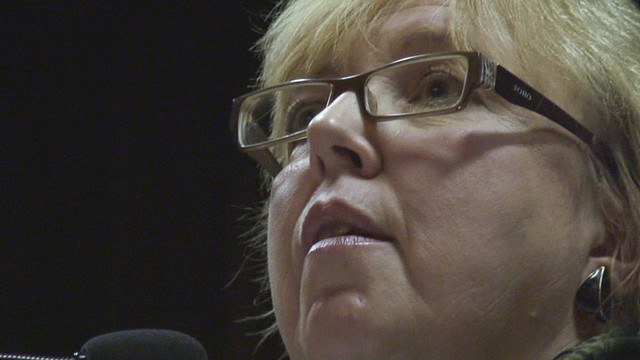Want to see an election campaign fact rich and spin poor? Chip in to keep our fact check blog up to date.
The claim: Green Pary Leader Elizabeth May says that she’s willing to co-operate with the NDP and the Liberals. Could both parties meet her conditions for support?
The Green Party’s chances at winning more than a meagre handful of seats this election are very slim. While Elizabeth May’s Saanich-Gulf Island seat is a slam dunk, the wildest of Green dreams can expect no more than three seats. Currently, one seat is the realistic projection.
Nevertheless, Elizabeth May and co. aren’t complete off base to fancy themselves kingmakers on October 20. With support for the Conservatives bottoming out, and Canadians pulled by the Anybody But Harper campaign, a few votes from Green MPs could make or break a party’s power.
Elizabeth May has positioned herself to be a defender of democracy and democratic renewal. At a campaign stop in Vancouver, responding to a question from a journalist, May described the conditions under which the Green Party would support an NDP or a Liberal government.
The Greens will support the Liberals or NDP if they:
1. Defend coastlines from tankers loaded with bitumen
2. Bring in proportional representation
3. Repeal Bill C-51 immediately
4. Restore basic parliamentary democracy (no omnibus budget bills, cut the PMO in half, etc.)
Can both parties meet May’s challenge?
Oil tankers: The first MP to oppose oil tankers off the West coast was NDP Denise Savoie in 2007. In 2014, NDP MP Nathan Cullen moved a private member’s bill to ban oil supertankers from B.C.’s north coast. It failed, though the Greens and Liberals supported it. Liberal MP Joyce Murray moved a motion to ban tanker traffic in 2011 too.
If May introduces pipelines into her ultimatum, she may be on shakier ground. So far, the Mulcair has failed to answer definitively on whether he would support the Kinder Morgan or Energy East pipelines. Mulcair’s inability to give a straight answer to May’s challenge leaves many climate-concerned voters questioning the NDP’s stance.
Proportional representation: Liberal Leader Justin Trudeau announced last June that the 2015 election would be the last one held under the current first-past-the-post system, though says that a variety of options would be studied, including online voting and ranked ballots (which wouldn’t necessarily be more representative). The NDP was first, and has promised to implement a system of mixed-member proportional representation if elected.
Bill C-51: The NDP has been clear that it will repeal C-51 once elected. It has been a central plank of their campaign. The Liberals have not. Instead, they’ve promised to repeal parts of C-51. While it’s possible that the party will change its mind, Trudeau has stated that he doesn’t want to look “soft on terrorism” by opposing the bill.
Democratic reform: This promise is rooted in fighting against how Harper has changed parliamentary democracy, and both the NDP and Liberals can vow to do things differently. But, the sponsorship scandal reminds all Canadians that the Liberals are also influenced by corruption.
Will May have her conditions met? The NDP is the closest to May’s ideal, and might be the best horse for them on which to bet. Though her tough talk might also convince the Liberals to keep playing to the left.
Verdict:

Photo: flickr/ Gordon McDowell
With files from Kaitlin McNabb and Michael Stewart.



